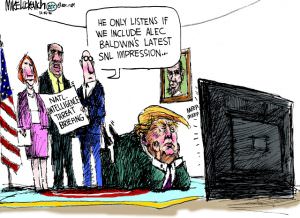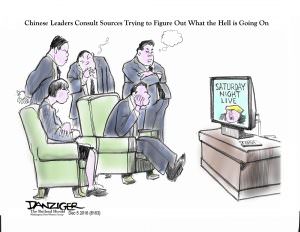Donald Trump Deserves to Be Ridiculed—It’s the One Thing That Terrifies Him
The president-elect has demonstrated repeatedly that he doesn’t like being on the receiving end of certain jokes, making that kind of humor a useful tool for resistance during his tenure in office.
President-elect Donald Trump draws media attention in the lobby of Trump Tower in New York City on Tuesday. (Andrew Harnik / AP )
Donald Trump has a thin skin. That personality trait is consistent with his large ego, desire to flaunt his wealth, portray himself as a playboy and aggressively fight every imagined slight.
The fact that the president-elect takes time away from the huge job of assembling a transition team and appointing a new Cabinet to watch Alec Baldwin’s caricature of him on “Saturday Night Live” and then tweet about it is a testament to Trump’s fragility. That is why his opponents must hit hard at that vulnerability as much as possible, just as Danielle Muscato did when she fired off a marvelous series of tweets in response, calling Trump out: “In 7 wks you’ll be responsible for 330m lives & you can’t think of anything better to do than tweet abt a comedy show. You know that actual lives are at stake, right? You’re pathetic.” Muscato’s riposte was a salve for those of us seeing an unending stream of bad news flowing from Washington these days.
Much has been written and said about the importance of resisting Trump’s agenda right from the start and the political organizing necessary to achieve that aim. There is absolutely no doubt that the most important thing we must do collectively is to mobilize against Trumpism and do so effectively. But part of that resistance ought to take a cultural form.
The last time we had a president who was hugely unpopular was George W. Bush, and political comedians had a field day mocking his sentence structure and clumsy speech. But Bush gave little indication of how he was affected by the derision. Trump, on the other hand, appears to take the mockery extremely seriously, which is of course a large part of why he is so unsuitable to lead the nation, and why the resistance to him must exploit this weakness.
A new book by Washington Post reporters Michael Kranish and Marc Fisher titled “Trump Revealed: An American Journey of Ambition, Ego, Money, and Power” offers several clues about Trump’s shortcomings. Fisher told me in an interview that very early in Trump’s career as a Manhattan real estate developer, the budding real-estate magnate claimed he was worth $200 million when in fact he had just a few thousand dollars to his name, and that Trump’s financial worth is “probably the single thing about himself that he’s the most sensitive about.” Fisher explained that some years ago when Comedy Central did a roast of Trump, the participating comedians were handed a sheet ahead of time — as is always the case — listing sensitive topics that are off-limits, such as children of the person being roasted. In Trump’s case the comedians were told, “Go ahead and make fun of the children, go ahead and make fun of the ex-wives, but the one thing you cannot make fun of is whether he’s really as rich as he says he is.”
The fact that he has not released his tax information, unlike every other presidential nominee of a major party since Richard Nixon, offers a hint that even today Trump may not be worth as much as he says. After all, it is the allure of being a billionaire that Trump offers to his working-class and middle-class supporters who admire the glitz and glamour of his lifestyle.
“SNL’s” Baldwin has appropriately demanded that Trump release his tax returns in exchange for dropping the repeat impersonations of the president-elect on the NBC show. One critic cleverly labeled the president-elect “Trumplethinskin” in a doctored photo of Baldwin asking for Trump’s tax details.
Fisher further revealed that Trump’s thin skin is attached to deep anxiety, explaining that he “has worn this cloak of resentment all of his life and he believes that he’s never been accepted in any field that he’s in. There is a certain insecurity … there is also a deep streak of narcissism.” Millions of Americans know that Trump does not belong in the White House. In addition to organizing against Trump’s dangerous agenda, we ought to make the next four years as deeply unnerving to him as possible so that he is reminded every single day that he will not get a pass on any of his disastrous policy decisions.
After all, it is only a matter of time before others exploit this weakness of Trump’s. Fisher revealed, “He’s someone who is easily goaded … it’s not difficult to do that, and competitors and his opponents realize that, and certainly other nations will realize that; and so there will be a temptation among leaders of rivals around the world to use that in whatever dealings they have with President Trump.” It is worth noting, however, that our mockery should never stoop to his level. So, fat-shaming him or “slut-shaming” his wife, Melania, is unnecessary and wrong. But on policy, on his incessant need to tweet his thoughts instantaneously, and, most important, on the extent of his wealth, unrelenting mockery is not just fair — it can be a powerful tactic. It sends a strong message of the people’s feelings, especially through the social media that Trump is so fond of. It keeps alive the idea that there is nothing normal about this election or this president-elect. It helps arm the most vulnerable among us with nonviolent weapons aimed at the man who is poised to unleash horrors upon us. For example, Muscato, the woman who fearlessly released a torrent of well-thought-out anger at Trump after his dismay over Baldwin’s “SNL” portrayal, is a transgender activist who told the press, “he’s hoping a ‘fake-it-til-you-make-it’ approach will be sufficient for the most powerful office in the world.” She added that Americans ought to push back “literally every time he says or proposes something that is unacceptable.”
We have a long and rich history of cultural resistance in the United States. Institutions like the Center for the Study of Political Graphics have preserved the visual art of resistance to war, poverty and racism for decades. Much of that resistance is marked by clever humor and mockery. Those among us who have encountered bullies in person know that the most effective way to throw them off their game is to laugh at them and taunt them, driving them to respond in ways that expose themselves, making them appear so weak and foolish that they are demoralized and ultimately beaten.
It will take much more than ridicule as a weapon to fight Trump. But it’s an important part of the arsenal, one that can also help lift our collective spirits, even if just a little.
If Trump wants a culture war, we’ll give him a culture war — just not of the type he likes or expects.
With an uncertain future and a new administration casting doubt on press freedoms, the danger is clear: The truth is at risk.
Now is the time to give. Your tax-deductible support allows us to dig deeper, delivering fearless investigative reporting and analysis that exposes what’s really happening — without compromise.
Stand with our courageous journalists. Donate today to protect a free press, uphold democracy and unearth untold stories.





You need to be a supporter to comment.
There are currently no responses to this article.
Be the first to respond.